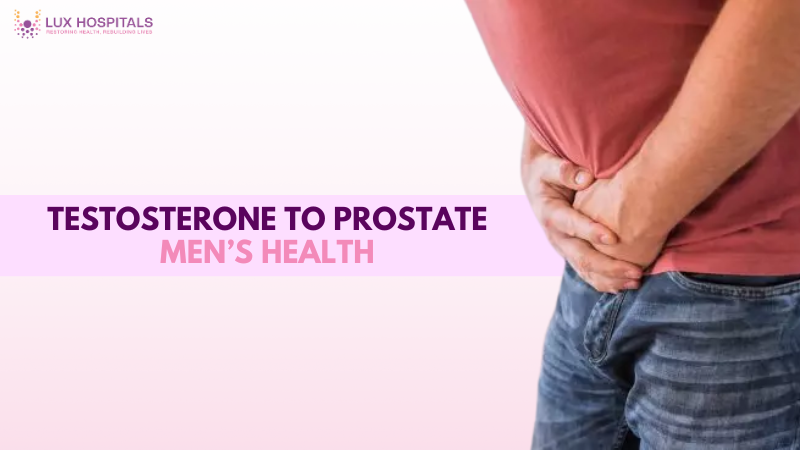One important but frequently disregarded component of well-being is men Health. Numerous factors influence a man’s general Health, ranging from sexual performance and fertility to testosterone levels and prostate care. This blog will cover major Men Health concerns in depth, focusing on hormonal balance, prostate health, sexual function, and preventive care all essential to a healthier, longer life.
Understanding Testosterone and Its Role
The primary male sex hormone, testosterone, is responsible for physical changes during puberty, muscle mass, bone density, libido, and energy Levels. Decreased physical performance, sadness, and low testosterone can all lead to fatigue and a diminished libido. For those who qualify, there are several therapeutic options, including hormone replacement therapy (HRT), and routine blood testing can assist in identifying low levels.
Signs of Low Testosterone:
- Low sex drive
- Chronic fatigue
- Decreased muscle mass
- Mood swings or depression
- Difficulty concentrating
Low testosterone affects men’s mental and physical health. Treatment options include lifestyle changes, medication, or HRT. Ignoring it can lower overall quality of life.
Prostate Health: A Top Priority for Aging Men
The walnut-sized gland that produces seminal fluid is called the prostate. As men age, the risk of conditions like benign prostatic hyperplasia (BPH), prostatitis, and prostate cancer increases. Annual screenings are crucial components of proactive Men Health management.
Common Prostate Problems:
- BPH (enlarged prostate): Causes frequent urination and weak urine flow
- Prostatitis: Inflammation of the prostate, often painful
- Prostate cancer: The Most common cancer among men
Digital rectal exams (DRE) and blood testing for prostate-specific antigen (PSA) are standard diagnostic tools. Early detection is key, especially since prostate issues can often be asymptomatic. Keeping the prostate healthy is a significant pillar of men health, particularly for men over 50.
Sexual Health is another critical aspect of Men Health, encompassing erectile function, libido, and satisfaction. Diabetes or heart disease may be detected early by erectile dysfunction (ED). Additional elements such as alcohol, stress, and some drugs may also play a role.
Key Concerns in Sexual Health:
- Erectile dysfunction
- Premature ejaculation
- Low libido
- Pain during intercourse
A healthy sex life contributes to mental well-being and strong relationships. If you’re experiencing sexual difficulties, don’t ignore them seek medical help. Sexual dysfunction is not just about intimacy; it’s a broader Men Health signal of what’s happening inside your body.
Fertility and Reproductive Health
Fertility issues that impact both partners and men are critical. The motility, count, and quality of sperm are essential for successful fertilization. Male fertility may be affected by conditions such as varicocele, infections, or lifestyle decisions (such as smoking, drinking, or being obese).
Warning Signs of Fertility Issues:
- Low ejaculate volume
- Pain or swelling in the testicles
- Difficulty conceiving after 12 months
- Hormonal imbalances
Routine semen analysis and hormone tests can pinpoint the cause. Early detection and care can increase the likelihood of fatherhood. Fertility is a vital component of Men Health, especially for couples planning a family.
Mental Health in Men
Despite being a fundamental aspect of Men Health, mental wellness is frequently stigmatized. Compared to women, men are less likely to seek therapy for depression, anxiety, or emotional stress. This can lead to substance abuse, poor Health, or even suicidal thoughts.
Common Symptoms:
- Persistent sadness or irritability
- Social withdrawal
- Difficulty sleeping or focusing
- Loss of interest in usual activities
Opening up about emotions and seeking professional help can save lives. Talk therapy, medication, or lifestyle changes can make a big difference. Prioritizing mental Health should be normalized in any modern Men Health discussion.
Preventive Care and Lifestyle Habits
Healthy habits lay the foundation for long-term Men Health. This calls for regular testing, a balanced diet, regular exercise, and adequate rest. The importance of preventive exams for heart disease, diabetes, colon cancer, and STDs is comparable.
Daily Habits for Better Health:
- 30 minutes of physical activity
- Eat whole foods and reduce sugar
- Limit alcohol and quit smoking
- Sleep at least 7 hours
- Manage stress
Good Health isn’t just about fixing problems but preventing them. Practicing healthy routines significantly lowers the risk of chronic diseases. Prevention is the smartest investment in Men Health.
Conclusion
Men Health covers far more than muscles and metabolism it’s a complete picture of your hormonal, sexual, reproductive, and emotional wellness. From testosterone levels to prostate screenings and mental health support, prioritizing your Health today means preventing future issues. Don’t ignore symptoms or delay checkups take charge of your well-being now.
Start with small, consistent steps: schedule an annual exam, eat healthier, and open up about any concerns with your healthcare provider. Remember, Men Health is not just a topic—it’s a commitment to a longer, stronger life.





















